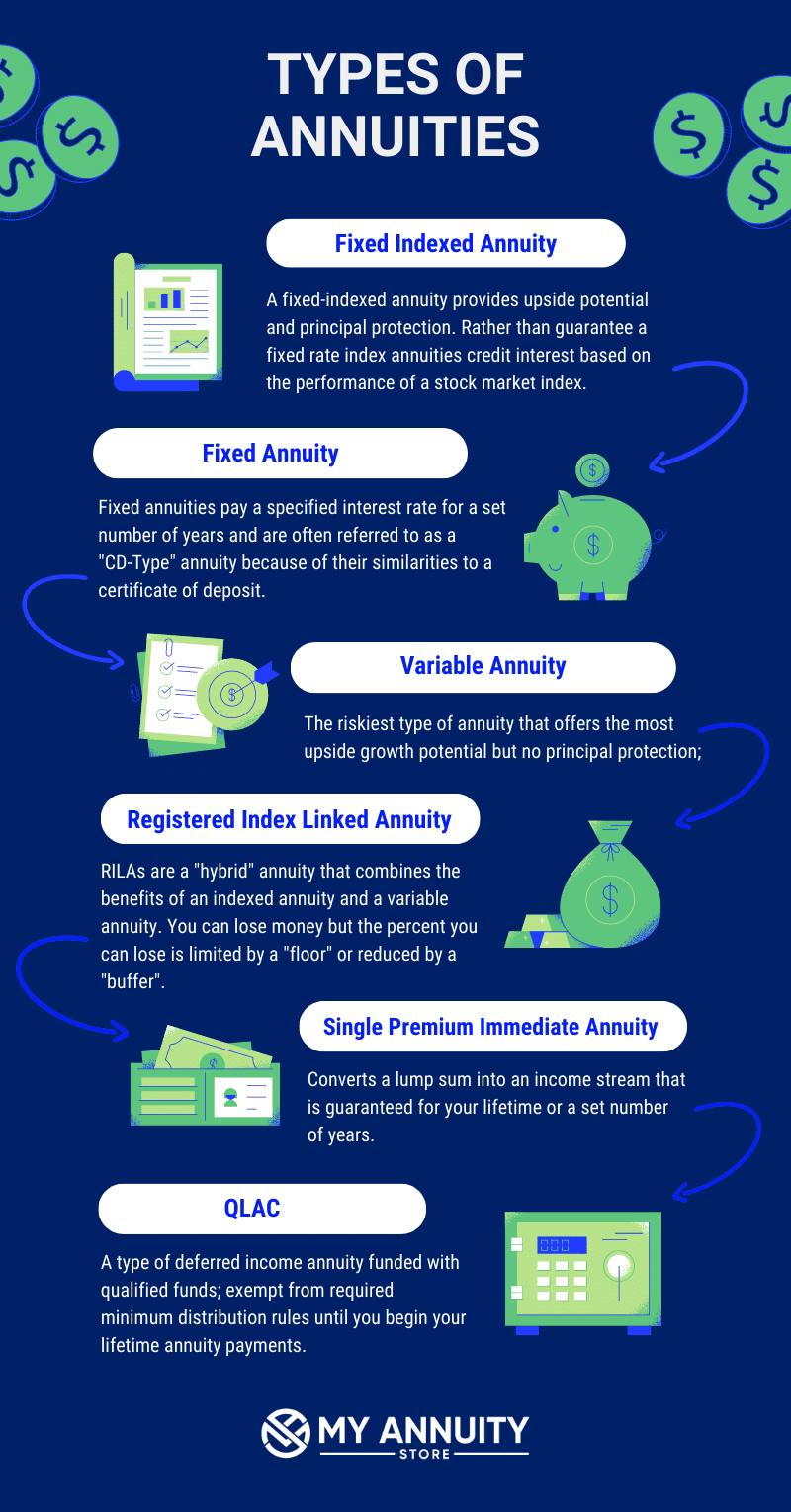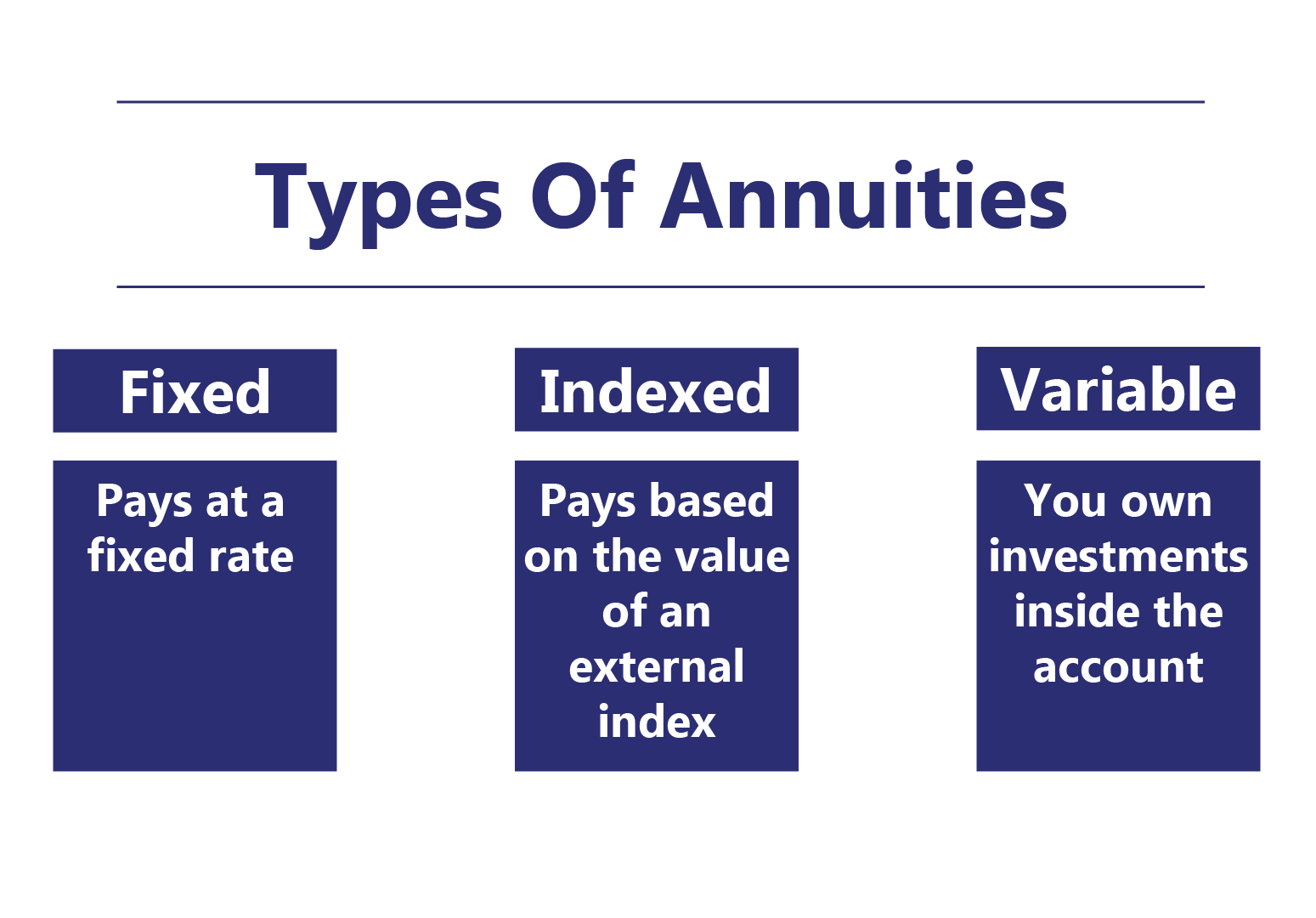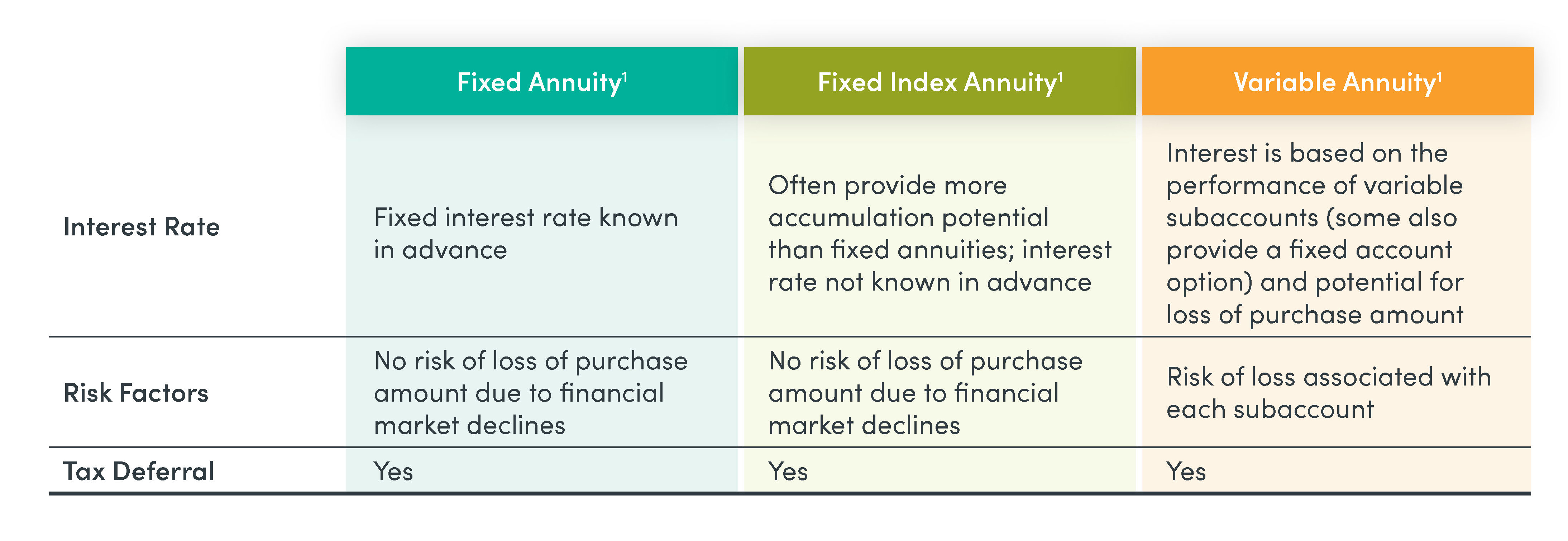All Categories
Featured
Table of Contents
With a variable annuity, the insurance provider purchases a portfolio of shared funds chosen by the buyer. The efficiency of those funds will certainly figure out exactly how the account expands and how big a payout the customer will eventually obtain. People who pick variable annuities are willing to tackle some level of danger in the hope of producing bigger profits.
If an annuity customer is married, they can pick an annuity that will proceed to pay revenue to their spouse need to they die initially. Annuities' payouts can be either instant or deferred. The basic question you require to think about is whether you want regular revenue currently or at some future date.
A credit allows the cash in the account even more time to expand. And much like a 401(k) or an specific retirement account (IRA), the annuity remains to accumulate earnings tax-free until the cash is withdrawn. In time, that could build up right into a considerable sum and lead to bigger repayments.
With a prompt annuity, the payouts start as quickly as the purchaser makes a lump-sum payment to the insurance provider. There are some other important choices to make in buying an annuity, depending upon your conditions. These include the following: Buyers can organize for payments for 10 or 15 years, or for the remainder of their life.
Understanding Fixed Interest Annuity Vs Variable Investment Annuity Everything You Need to Know About Variable Annuity Vs Fixed Indexed Annuity What Is the Best Retirement Option? Advantages and Disadvantages of Different Retirement Plans Why Choosing the Right Financial Strategy Matters for Retirement Planning Fixed Annuity Vs Variable Annuity: A Complete Overview Key Differences Between Different Financial Strategies Understanding the Risks of Fixed Vs Variable Annuity Pros And Cons Who Should Consider Fixed Interest Annuity Vs Variable Investment Annuity? Tips for Choosing Fixed Interest Annuity Vs Variable Investment Annuity FAQs About Planning Your Financial Future Common Mistakes to Avoid When Choosing a Financial Strategy Financial Planning Simplified: Understanding Indexed Annuity Vs Fixed Annuity A Beginner’s Guide to Deferred Annuity Vs Variable Annuity A Closer Look at Fixed Vs Variable Annuities
That could make good sense, as an example, if you require a revenue increase while repaying the last years of your home loan. If you're married, you can choose an annuity that pays for the rest of your life or for the remainder of your spouse's life, whichever is much longer. The last is typically described as a joint and survivor annuity.
The choice between deferred and immediate annuity payments depends mainly on one's financial savings and future revenues goals. Immediate payouts can be useful if you are currently retired and you require an income to cover everyday costs. Immediate payments can start as quickly as one month right into the purchase of an annuity.
People normally buy annuities to have a retired life revenue or to develop savings for an additional purpose. You can acquire an annuity from a licensed life insurance representative, insurance policy company, monetary organizer, or broker. You must speak to a monetary consultant about your needs and goals before you acquire an annuity.
The difference between the two is when annuity payments start. You do not have to pay taxes on your earnings, or contributions if your annuity is a private retirement account (IRA), until you take out the profits.

Deferred and immediate annuities offer several alternatives you can select from. The alternatives give different degrees of prospective danger and return: are guaranteed to gain a minimal rates of interest. They are the lowest economic danger yet offer reduced returns. earn a higher rates of interest, yet there isn't a guaranteed minimum rate of interest.
Variable annuities are higher threat because there's an opportunity you might lose some or all of your money. Set annuities aren't as high-risk as variable annuities due to the fact that the financial investment risk is with the insurance policy business, not you.
Understanding Fixed Interest Annuity Vs Variable Investment Annuity A Comprehensive Guide to Investment Choices Defining the Right Financial Strategy Pros and Cons of What Is Variable Annuity Vs Fixed Annuity Why Choosing the Right Financial Strategy Is a Smart Choice How to Compare Different Investment Plans: Simplified Key Differences Between Fixed Vs Variable Annuity Pros Cons Understanding the Rewards of Fixed Indexed Annuity Vs Market-variable Annuity Who Should Consider Strategic Financial Planning? Tips for Choosing Fixed Vs Variable Annuities FAQs About Tax Benefits Of Fixed Vs Variable Annuities Common Mistakes to Avoid When Planning Your Retirement Financial Planning Simplified: Understanding Fixed Interest Annuity Vs Variable Investment Annuity A Beginner’s Guide to Fixed Annuity Vs Equity-linked Variable Annuity A Closer Look at How to Build a Retirement Plan
Set annuities guarantee a minimum rate of interest rate, typically in between 1% and 3%. The firm might pay a higher rate of interest rate than the guaranteed passion rate.
Index-linked annuities show gains or losses based on returns in indexes. Index-linked annuities are a lot more complicated than fixed deferred annuities. It is necessary that you recognize the attributes of the annuity you're thinking about and what they suggest. Both contractual attributes that influence the amount of interest attributed to an index-linked annuity the most are the indexing method and the involvement rate.
Analyzing Strategic Retirement Planning Key Insights on Fixed Index Annuity Vs Variable Annuities Defining the Right Financial Strategy Features of Smart Investment Choices Why Variable Annuity Vs Fixed Annuity Can Impact Your Future How to Compare Different Investment Plans: Simplified Key Differences Between Different Financial Strategies Understanding the Key Features of Fixed Annuity Or Variable Annuity Who Should Consider Strategic Financial Planning? Tips for Choosing the Best Investment Strategy FAQs About Fixed Annuity Vs Equity-linked Variable Annuity Common Mistakes to Avoid When Choosing a Financial Strategy Financial Planning Simplified: Understanding Fixed Income Annuity Vs Variable Annuity A Beginner’s Guide to Smart Investment Decisions A Closer Look at Pros And Cons Of Fixed Annuity And Variable Annuity
Each depends on the index term, which is when the company determines the passion and credit reports it to your annuity. The determines exactly how much of the boost in the index will certainly be made use of to determine the index-linked interest. Other important features of indexed annuities include: Some annuities cap the index-linked rate of interest.
Not all annuities have a flooring. All taken care of annuities have a minimal surefire worth.
Analyzing Strategic Retirement Planning Everything You Need to Know About Financial Strategies Defining the Right Financial Strategy Features of Smart Investment Choices Why Fixed Annuity Or Variable Annuity Is a Smart Choice Deferred Annuity Vs Variable Annuity: Explained in Detail Key Differences Between Fixed Vs Variable Annuities Understanding the Risks of Choosing Between Fixed Annuity And Variable Annuity Who Should Consider Strategic Financial Planning? Tips for Choosing the Best Investment Strategy FAQs About Planning Your Financial Future Common Mistakes to Avoid When Planning Your Retirement Financial Planning Simplified: Understanding Variable Annuity Vs Fixed Annuity A Beginner’s Guide to Fixed Income Annuity Vs Variable Annuity A Closer Look at How to Build a Retirement Plan
The index-linked passion is added to your initial costs amount but does not compound throughout the term. Other annuities pay substance interest during a term. Compound passion is passion earned on the cash you conserved and the interest you earn. This indicates that passion currently credited also makes passion. In either instance, the interest earned in one term is generally intensified in the next.
This portion may be used as opposed to or along with an engagement rate. If you take out all your cash before completion of the term, some annuities won't attribute the index-linked interest. Some annuities could credit just part of the passion. The portion vested typically enhances as the term nears completion and is constantly 100% at the end of the term.
This is because you bear the financial investment danger as opposed to the insurance provider. Your agent or financial consultant can assist you make a decision whether a variable annuity is right for you. The Securities and Exchange Payment classifies variable annuities as safety and securities since the efficiency is acquired from stocks, bonds, and various other investments.

Find out more: Retirement in advance? Consider your insurance. An annuity contract has two phases: an accumulation stage and a payment phase. Your annuity earns passion during the build-up phase. You have several options on just how you add to an annuity, depending on the annuity you purchase: enable you to select the moment and quantity of the settlement.
enable you to make the very same repayment at the very same period, either monthly, quarterly, or yearly. The Internal Revenue Service (IRS) manages the tax of annuities. The internal revenue service allows you to postpone the tax on incomes until you withdraw them. If you withdraw your incomes before age 59, you will possibly need to pay a 10% very early withdrawal penalty along with the tax obligations you owe on the interest made.
After the buildup phase ends, an annuity enters its payout phase. This is often called the annuitization phase. There are numerous options for getting repayments from your annuity: Your firm pays you a taken care of amount for the time specified in the agreement. The business pays to you for as lengthy as you live, yet there are none repayments to your successors after you die.
Analyzing Fixed Vs Variable Annuity Pros And Cons A Closer Look at How Retirement Planning Works Breaking Down the Basics of Variable Annuities Vs Fixed Annuities Pros and Cons of Annuity Fixed Vs Variable Why Fixed Annuity Vs Variable Annuity Is Worth Considering How to Compare Different Investment Plans: How It Works Key Differences Between Fixed Annuity Or Variable Annuity Understanding the Key Features of Annuities Fixed Vs Variable Who Should Consider Strategic Financial Planning? Tips for Choosing the Best Investment Strategy FAQs About Fixed Annuity Or Variable Annuity Common Mistakes to Avoid When Choosing Indexed Annuity Vs Fixed Annuity Financial Planning Simplified: Understanding Fixed Income Annuity Vs Variable Growth Annuity A Beginner’s Guide to Smart Investment Decisions A Closer Look at Fixed Index Annuity Vs Variable Annuities
Numerous annuities charge a charge if you withdraw cash before the payout phase. This penalty, called a surrender fee, is generally highest in the very early years of the annuity. The cost is usually a portion of the taken out cash, and typically starts at around 10% and drops annually till the surrender period is over.

Annuities have other costs called loads or commissions. Sometimes, these fees can be as much as 2% of an annuity's worth.
Variable annuities have the capacity for greater revenues, yet there's more danger that you'll lose cash. Be careful regarding putting all your properties into an annuity.
Annuities marketed in Texas should have a 20-day free-look duration. Substitute annuities have a 30-day free-look period.
Table of Contents
Latest Posts
Highlighting the Key Features of Long-Term Investments A Comprehensive Guide to Investment Choices What Is the Best Retirement Option? Features of Fixed Index Annuity Vs Variable Annuities Why Choosin
Analyzing Strategic Retirement Planning Everything You Need to Know About Financial Strategies What Is Indexed Annuity Vs Fixed Annuity? Pros and Cons of Choosing Between Fixed Annuity And Variable An
Analyzing Strategic Retirement Planning A Comprehensive Guide to Fixed Vs Variable Annuity Pros And Cons Defining the Right Financial Strategy Pros and Cons of Various Financial Options Why Choosing t
More
Latest Posts